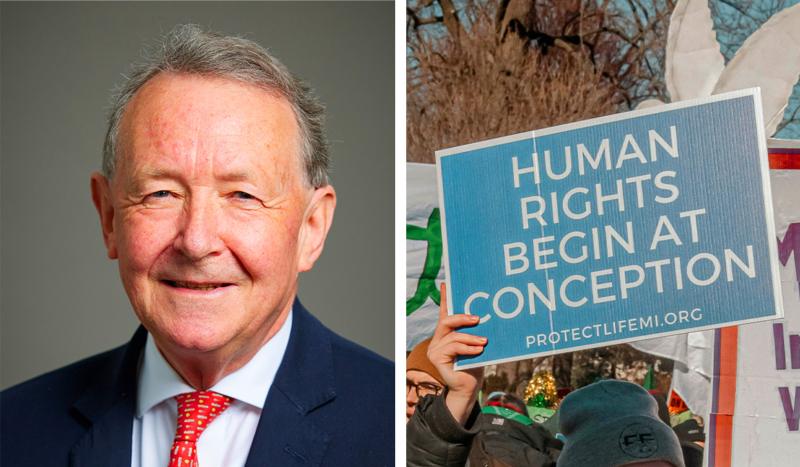
Lord Alton of Liverpool / UK Parliament (Left), Maria Oswalt / Unsplash
Though some have posited that the radical pro-abortion and pro-assisted suicide bills in England and Wales will surely become law because the House of Commons passed them, their defeat may yet still be possible, according to a pro-life House of Lords member.
In June, the United Kingdom Parliament’s House of Commons voted in favor of legalizing assisted suicide in England and Wales, just days after voting to decriminalize abortions up to and during birth. These votes advanced the legislation to the House of Lords, where bills are typically further scrutinized and sometimes revised; and while it is technically more difficult for lawmakers to strike them down entirely at this stage, it is not outside the realm of possibility.
For Lord David Alton of Liverpool and fellow pro-life colleagues, this full defeat is the goal.
“Now is not the time for pro-life advocates to wave the white flag,” Alton wrote in a July 21 article for The Conservative Woman. “Quite the reverse. Never before have the vulnerable and the voiceless been so under threat in this country.”
However, he is also optimistic that change is possible.
“We owe it to those who are endangered by these recent parliamentary decisions to battle on,” he wrote.
Alton observed that many legislators appear to not have accounted for the huge ethical and societal implications the bills bear, noting the abortion amendment reached a key stage after less than an hour of debate “and zero scrutiny.”
“You might have thought that after ending the lives of more than 10million British babies (98 per cent under the social clause) since legalising abortion – that’s more than 250,000 annually, or 550 every day, 23 every hour, one in three of all pregnancies – legislators might have drawn breath and considered the consequences of what they set in motion,” Alton wrote. “It is deeply irresponsible to set aside the human, social, demographic and economic sequelae of a law and a policy which uniquely avoids any parliamentary scrutiny and about which rational debate is frequently closed down.”
He noted that the debate and backlash sparked by the abortion amendment may cause hearts and minds to be opened to understanding the harm caused by abortion. Many people who had previously regarded themselves as “moderately pro-choice” or not outspoken on the issue have expressed opposition to the amendment in recent weeks, according to Alton.
“The thought of aborting a baby up to birth is nothing short of barbaric. It is cruel and unworthy of a nation like ours,” he wrote. “It may just be that the penny has finally dropped among people previously willing to tolerate abortion. Their eyes are being opened to the scale of what has been unleashed and the consequences for society.”
Alton served in the House of Commons from 1979 to 1997, and since then has served as a crossbench peer in the House of Lords, according to his author profile. Noting how the House of Commons advanced the pro-assisted suicide legislation just days after the abortion vote, Alton wrote, “It is hard to think of a week in a long parliamentary career where there has been such a determined onslaught against human life at its most vulnerable moments.”
The assisted suicide bill will have a Second Reading Sept. 12 in the House of Lords, where “it will face fierce opposition” from a number of baronesses, according to Alton.
A vote will not take place at second reading, but votes will take place at the committee and report stages, according to Alton.
“The House of Lords is within its rights to amend the assisted suicide Bill,” Alton wrote, “and also, at Third Reading, to reject it.”
As the key stages lie ahead, Alton summed up his intentions with the headline of the Conservative Woman article titled: “My fellow peers and I will do our damnedest to halt these evil abortion and assisted dying Bills.”
He expressed hope at the fact that a number of colleagues have in recent months reversed course on their stance on assisted suicide, including many who now recognize “that so-called safeguards are not worth the paper on which they are written.” Others are concerned about coercion, financial gain, and forcing physicians to violate their oath to “do no harm” by supporting someone’s suicide.
